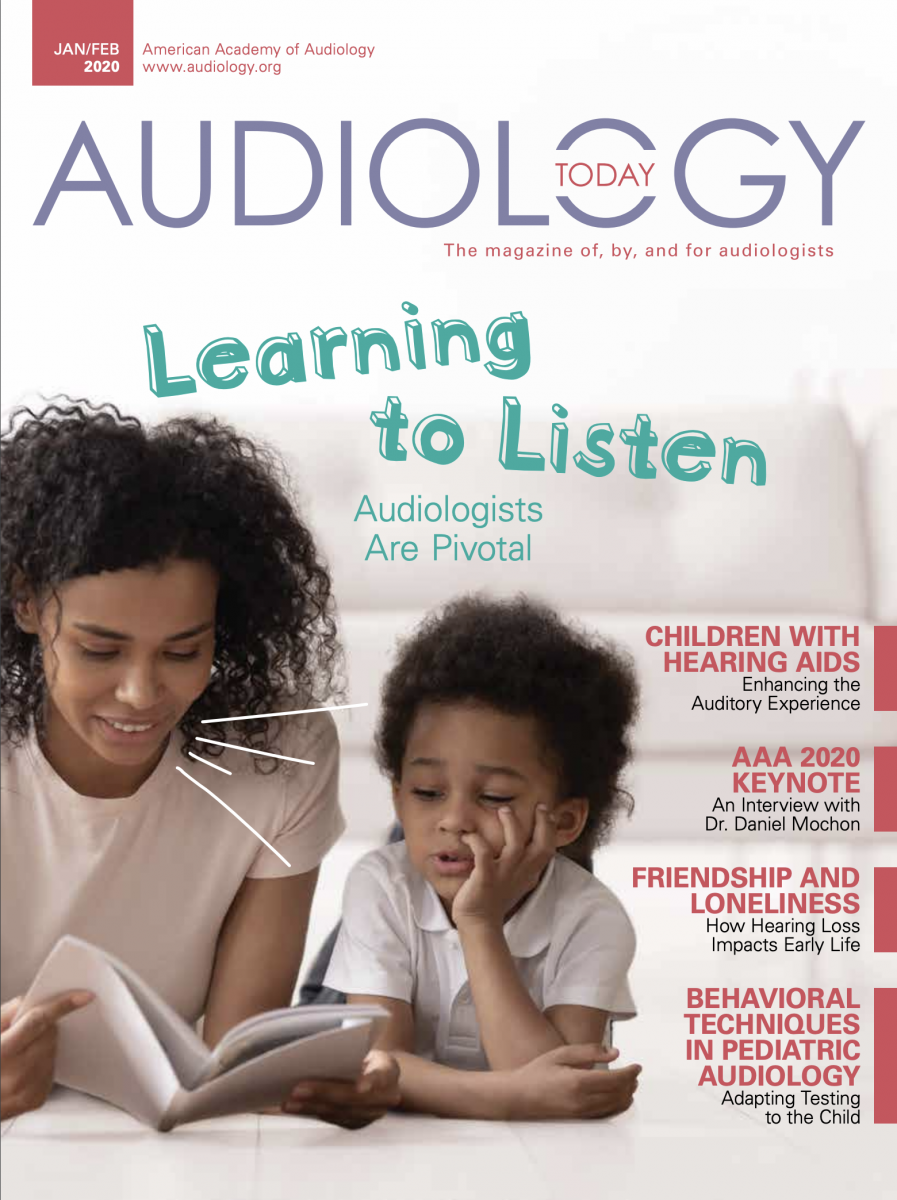
The editorial team and I are so happy to announce the content for this latest issue of Audiology Today. We are featuring a number of comprehensive, relevant, and interesting articles, as well as some short reads on public relations, coding and reimbursement, and audiology advocacy.
Take a look at the table of contents and delve into these online articles, which you can now easily search by topic, title, or author. We appreciate your patience as we continue to upload back issue content, but I hope you find this new format easy to explore.
- READERSHIP SURVEY RESULTS | Audiology Today Summary 2019
Author(s): Erin C. Schafer | Catherine Palmer
On October 28, 2019, the editorial staff of Audiology Today (AT) sent Academy members a readership survey to gain insight into reader demographics, work settings, patient populations, and reader preferences. - Learning to Listen: Audiologists Are Pivotal
Author(s): Carol Flexer | Elizabeth B Cole
What can audiologists do in their daily practice to support a child’s development of listening skills? - Enhancing the Auditory Experience in Children with Hearing Aids
Author(s): Erin C. Schafer | Ryan McCreery
Pediatric audiologist Ryan McCreery, PhD, will present the Marion Downs Lecture in Pediatric Audiology on April 3 at AAA 2020 + HearTECH Expo in New Orleans. - Behavioral Economics: A Conversation with Dr. Daniel Mochon, AAA 2020 Keynote Presenter
Author(s): Catherine Palmer
Dr. Mochon is a behavioral economist focused on consumer behavior and decision making. Academy President Catherine Palmer, PhD, met with him at Tulane University to learn more about his work. This is her report of their conversation - Friendship and Loneliness in Children and Adolescents with Hearing Loss
Author(s): Andrea D. Warner-Czyz
Every child represents a unique amalgamation of communication skills and temperament characteristics, highlighting the importance of explicitly asking individual children and adolescents with hearing loss about their social interactions to gauge the need for provision of referrals and resources. - Behavioral Techniques in Pediatric Audiology
Author(s): James Peck
Combining behavior-altering strategies with principles of child psychology can guide us in making a child more amenable to testing. - EDUCATIONAL AUDIOLOGY | Scope of Practice for Educational Audiology
Author(s): Erin Donlin | Cheryl DeConde Johnson
The Educational Audiology Association (EAA) recently developed and approved scope of practice (SOP) for audiologists who work in educational settings. The SOP describes essential practice areas that are unique to the practice of educational audiology (EAA, 2019). - CODING AND REIMBURSEMENT | Medicare QPP Rules for 2020
Author(s): Carrie Kovar
Under the final Quality Payment Program (QPP) rule for 2020, the Centers for Medicare and Medicaid Services (CMS) finalized a new Audiology Specialty Measure Set for audiology participation in the Quality category of the Merit-Based Incentive Payment System (MIPS) (2020 performance period/2022 pa - AUDIOLOGY ADVOCATE | Building Grassroots Advocates at AAA 2020 + HearTECH Expo
Author(s): Jodi Baxter
An integral component of successful advocacy in an association is the strength of the grassroots network. Staff can lay the groundwork and make the necessary connections with legislative and regulatory offices; however, what can be most impactful is the messaging of many individual members. - ACADEMY NEWS | Jerry Northern Scholarship in Pediatric Audiology
The AAA Foundation is excited to announce a new scholarship opportunity for students interested in pediatric audiology.
Recent Posts
ASLP-IC Readies for Rollout: Here’s What You Need to Know
The Audiology and Speech-Language Pathology Interstate Compact (ASLP-IC) continues to move toward full implementation, expanding opportunities for audiologists and speech-language pathologists to practice across state…
How Do Animals Perceive Music?
Music can be defined as vocal, instrumental, or mechanical sounds, with rhythm, melody or harmony, and often, an expression of human emotion. Music can transcend…
‘Eye’ on Health: AI Detects Dizziness and Balance Disorders Remotely
Interesting research led by audiologist Ali Danesh, PhD, at Florida Atlantic University (FAU) helped develop a novel, proof-of-concept tool to help identify nystagmus using a…


